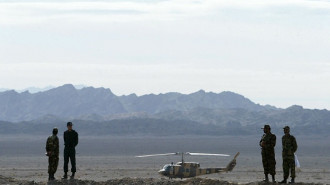Iran summons Swiss envoy over US frozen asset ruling
Iran Tuesday summoned Switzerland's ambassador, who represents Washington's interests in Tehran, to protest a court ruling that allows $2 billion of frozen Iranian assets be used to compensate American victims of "terror".
The US Supreme Court ruled last week that Iran must hand the sum to survivors and relatives of those killed in attacks blamed on the Islamic republic.
Foreign Minister Mohammad Javad Zarif threatened Monday to take legal action in the International Court of Justice against the United States if the amount in frozen funds is "diverted".
"We hold the US administration responsible for preservation of Iranian funds and if they are plundered, we will lodge a complaint with the ICJ for reparation," Zarif said.
Last week, Tehran said the ruling amounted to theft.
A senior official at the foreign ministry on Tuesday handed Swiss ambassador Giulio Haas two notes bearing Iran's "official objection", a statement said.
It called the Supreme Court decision "a clear violation of agreed mutual commitments" and "both the judicial impunity and that of Iranian government's properties and funds".
It also reprimanded a local New York court's recent verdict that accused Iran of having a role in the September 11, 2001 attacks.
The court in March said Tehran had to pay $10 billion to the victims of 9/11 and insurers after Iran failed to show up to defend itself against the charges.
These "baseless accusations to our country, without any documents or proof, ... are ridiculous and against accepted international law norms," the note said.
The Supreme Court decision affects more than 1,000 Americans.
The attacks blamed on Iran include the 1983 bombing of a US Marine barracks in Beirut and the 1996 Khobar Towers bombing in Saudi Arabia.
Iran's own Supreme Court also voiced its disapproval Tuesday, judiciary news service Mizan Online reported.
"The courts of every country have authority over their own territory and international civil cases" must be handled either through the International Court of Justice or through mutual agreement, it said.
"These decisions are based on no logic other than the law of jungle and are more like an instance of international banditry rather than legal action."

![Palestinians mourned the victims of an Israeli strike on Deir al-Balah [Getty]](/sites/default/files/styles/image_684x385/public/2024-11/GettyImages-2182362043.jpg?h=199d8c1f&itok=xSHZFbmc)


![The law could be enforced against teachers without prior notice [Getty]](/sites/default/files/styles/image_684x385/public/2178740715.jpeg?h=a5f2f23a&itok=hnqrCS4x)
 Follow the Middle East's top stories in English at The New Arab on Google News
Follow the Middle East's top stories in English at The New Arab on Google News
![Fakhrizadeh [AFP] Fakhrizadeh [AFP]](/sites/default/files/styles/image_330x185/public/media/images/774C39F7-8F7A-4D67-B998-27D102FCB4A7.png?h=d1cb525d&itok=j9eGvunV)

